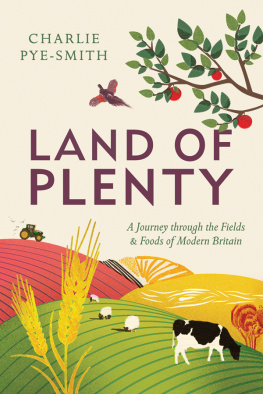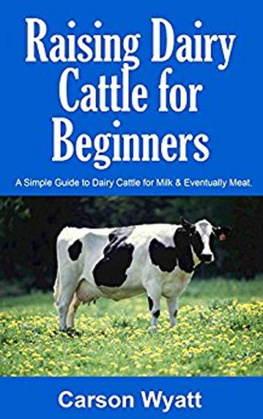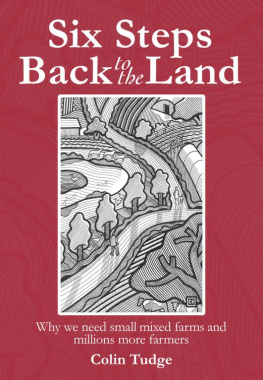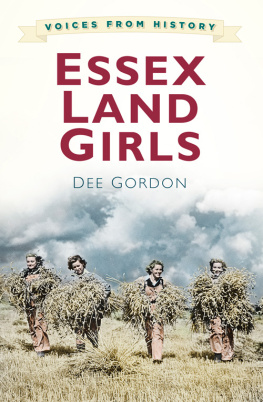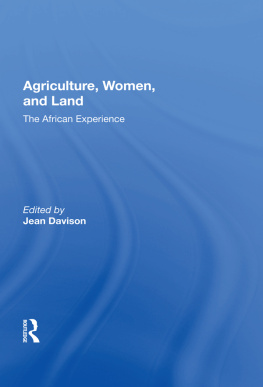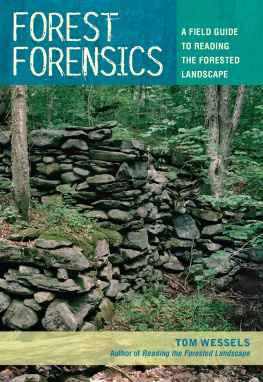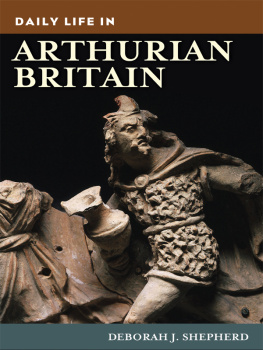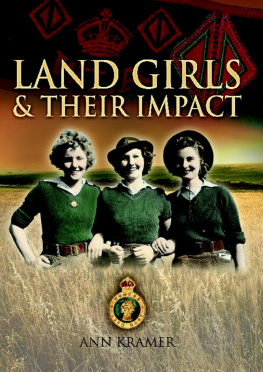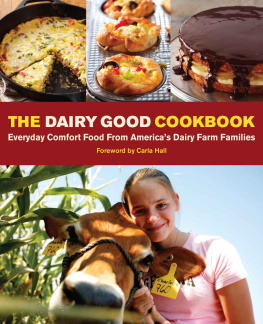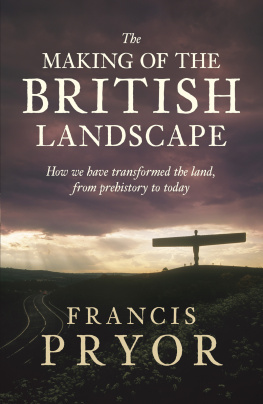LAND OF
PLENTY

For Sandie, Sophie and Chris
Contents
Introduction
I was brought up in a small valley on the outskirts of Huddersfield, a wool town in the West Riding of Yorkshire. When I reached the age of six or seven, in the late 1950s, I used to wander where I pleased among the fields and farms. Nobody seemed to mind. I watched, with a mixture of horror and fascination, the goings-on at the pig farm behind our back garden owned by Mr Codd. I still shudder at the memory of him pulling piglets out of the shell of an abandoned post office van before slicing off their testicles with a razor and feeding them to his dogs. More pleasurable were the frequent jaunts down to the farm in the valley bottom owned by Mr and Mrs Sheard, who delivered our daily milk and eggs. They were kindly folk and would let me and my friends scramble around the farm, peer into the cow byre and look for sticklebacks in the stream below their farmhouse.
My early enthusiasm for agricultural matters was kindled on farmhouse summer holidays, always taken at harvest time, first in North Yorkshire, later in West Wales and Ross and Cromarty. From the moment we arrived to the moment we left I would busy myself around the farms collecting eggs, feeding pigs, watching cows calve, rounding up sheep, stacking straw. This, I decided, was the life for me and I applied for a place at Newcastle University to study agriculture.
Before I went there, I spent a year on a farm in the Yorkshire Dales, near the market town of Masham. It was the best of times, it was the worst of times, though not in that order. I began work on the Clifton Estate just after the cereal harvest and spent the first five or six weeks chisel-ploughing stubble fields, alone with my thoughts, the smell of diesel and the autumnal weather. In November I was transferred to the dairy, where I was entrusted with mostly mundane tasks: gathering the cows at 5 oclock in the morning and bringing them in for milking; forking silage, sometimes in sleet and snow; feeding calves; scraping slurry and washing out the parlour. From time to time I was allowed to milk the cows, but the more temperamental among them sensed my lack of experience and lashed out with their hooves. I had a miserable winter.
But all this changed with the coming of spring. I was transferred back to the arable side of the farm and I recall the summer of 1970 with nostalgic clarity. My memories are not so much of the farm work although there were many activities I loved, especially at hay-time and harvest but of the chatter with my fellow farmworkers, one of whom is still a great friend. In those days there was the daily ritual of allowance or bait time when we ate our mid-morning sandwiches. In busy periods this never amounted to more than a ten-minute break, but during the quieter times of year it could be spun out for thirty or forty minutes before the foreman, Percy Vayro, would declare, hurriedly pulling a fob watch from his waistcoat, that it was time to get back to work. The best way to get a long bait time was to encourage Percy or one of the older farmworkers some were born just after the First World War to talk about days gone by. You only had to mention horses towd yasses, as Percy would call them to get the most intricate explanations of what it was like ploughing with horses, what you had to do to make them pee at the end of a row, and other interesting quirks of equine behaviour.
I even enjoyed some of the drearier tasks, such as hoeing turnips in the company of Bill Thorburn, who had just been released from Dartmoor Prison, where he had served time for manslaughter, and picking wild oats in the company of Rabbit Close and a gang of casual labourers, including a young man who used to turn up with a ferret squirming in his coat pocket. It is over forty years since I saw most of these characters and many are now dead, but I can remember their accents and laughter and some of the conversations we had, just as I can instantly recall, if I close my eyes, the acrid odour of the silage pit, the sweet aromas that rose from newly mown hay meadows, the clack-clack of the grass cutter, the milky smell of a warm cows udder, the foul stench of a calf with scour, the dusty nose-clogging air in the corn-drying shed.
By the end of the year I knew that I would make an incompetent farmer, so when I got to university I changed subjects to botany and zoology and pursued a very different career. Nevertheless, farming remains the first love of my life and I have spent a good deal of time writing about the challenges of making a living from the land. During the past two decades my focus has been largely on Africa and other parts of the developing world, but I have kept in touch with farming friends in Yorkshire and followed the news about developments in the countryside, often with a sense of frustration.
Frustration, because it seems that although a great many people are fascinated by food just look at the viewing figures for programmes like MasterChef they often know little or nothing about our oldest and most important industry. You could get by without a car or electric lighting, without soft furnishings and fine wines, without newspapers and iPads and trips to Barcelona or Bognor. But however rich or poor you are, whether you live in a city skyscraper or a remote cottage, you must eat to live.
If our distant ancestors were not farmers, they were probably related to farmers and would have had a keen understanding of how their food was produced. Thats no longer the case. Many people living in Britain today must go back several generations before they find a member of the family who worked on the land, and their knowledge of country matters comes largely from books, the Internet and television, rather than hands-on experience. No wonder, then, that most people know little about food production and even less about the people who produce it.
While I was researching Land of Plenty I made my way round the countryside in a motorhome, beginning one spring, ending the next I heard countless stories that illustrate our ignorance. One farmer told me how a customer in a farmers market in Northamptonshire returned to complain about a chicken he had just bought. Youve sold me a dud, he said. The chicken, he explained indignantly, only had two legs. Hed been expecting four, which is how they come in a supermarket pack. It is not just people living in urban areas who know little about farming matters. I often give talks to Womens Institutes in villages round here, said a Lake District dairy farmer, and I frequently have to explain that you cant get milk from a cow until shes had a calf. Many people dont understand even the simplest things about farming.
However, this doesnt mean we are ignorant about the countryside. According to the philosopher Roger Scruton, rural documentaries simultaneously users manuals and dreamers rhapsody had become the most popular form of non-fiction among the reading public by the beginning of the twentieth century. Drop into any good bookshop today and you will still find tables groaning under books about the countryside. A few may be about farming matters, the most notable during recent years being James Rebanks The Shepherds Life, but the vast majority come under the headings of nature writing, rural travelogue or conservation. Many are suffused with what Scruton describes as a culture of lamentation. They focus on the destruction of our rural heritage, desecration of landscapes and loss of wildlife, with farmers and landowners often cast as villains.
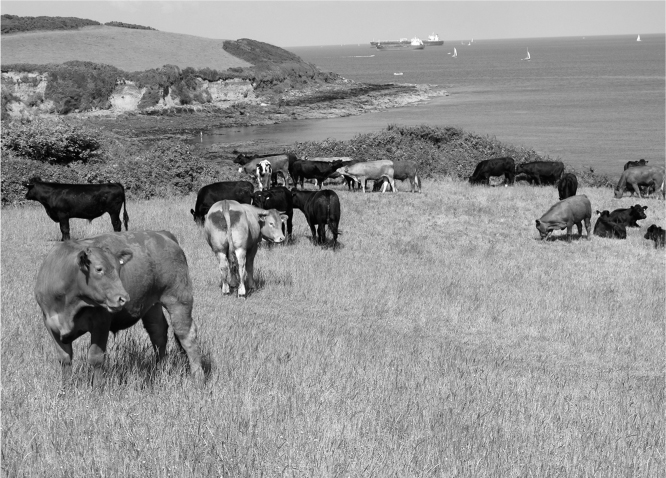
Next page
